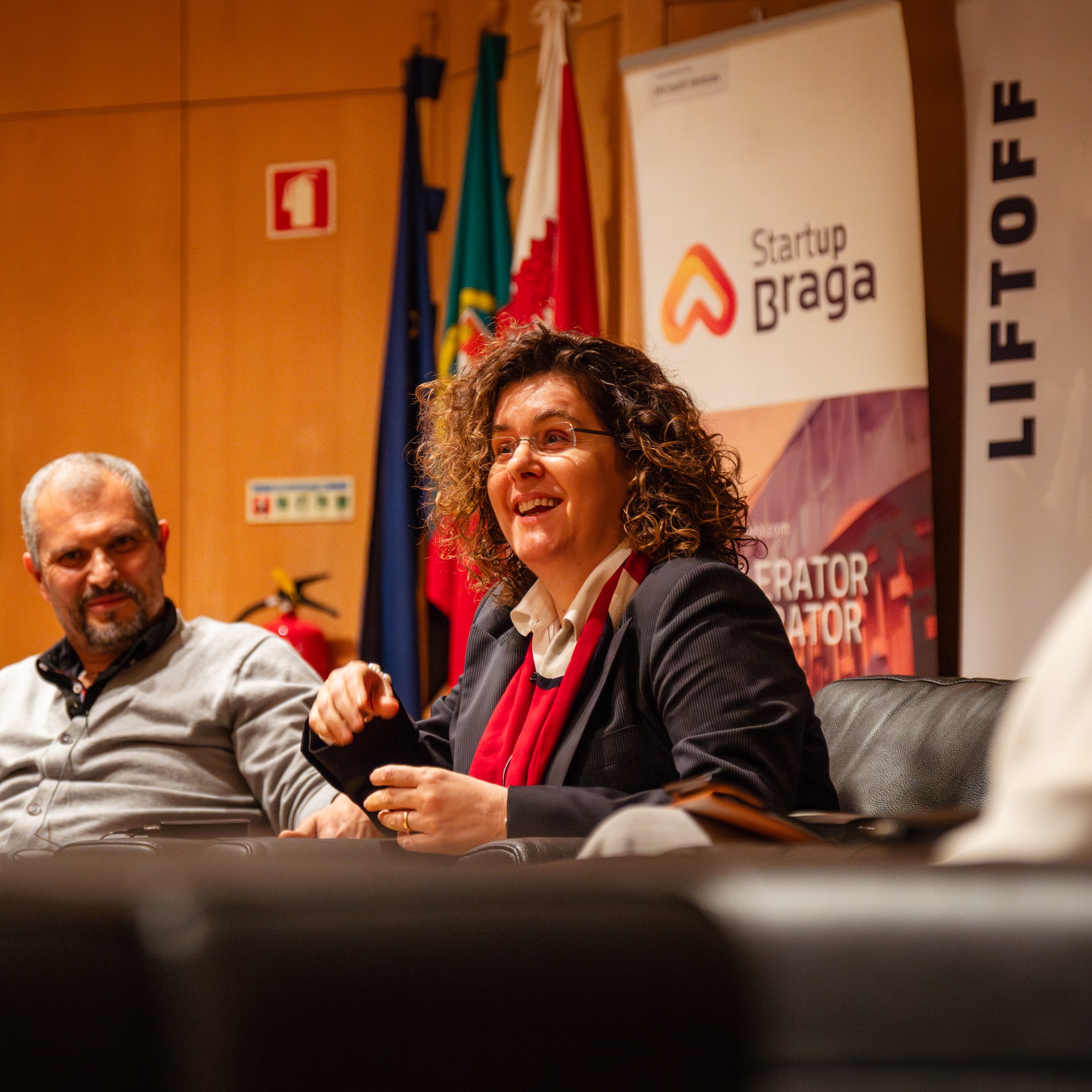O campus de Gualtar, na Universidade do Minho, foi o epicentro da inovação e do empreendedorismo esta quarta-feira, com a 3.ª edição do Innovation Day. Organizado pela Startup Braga e pela AAUMinho, o evento reuniu estudantes e especialistas para discutir os desafios e oportunidades do setor, bem como para antecipar a nova edição do Programa de Ideação Startup Point.
A sessão de abertura contou com a presença de Luís Rodrigues, diretor da Startup Braga, Rosa Vasconcelos, provedora do estudante da Universidade do Minho, e Sofia Ribas, secretária da direção da AAUMinho. Rosa Vasconcelos afirmou que, desde a pandemia, “os alunos não vivem a academia em pleno”. "A participação em iniciativas como esta é extremamente importante — é essencial olhar para as competências empreendedoras", salientou.
Seguiu-se o painel "Do Laboratório para o Mundo: Validar, Proteger e Crescer", com a participação de Anabela Carvalho, da Patentree, Mónica Gonçalves, do 2CA-Braga, Simão Soares, da SilicoLife, e Ricardo Machado, do Instituto CCG/ZGDV.
Para Ricardo Machado, a paixão pela criação cresceu com o Professor Pardal e o seu fiel companheiro Lampadinha, do universo da Walt Disney. Numa das suas histórias, o galinácio inventou um descaroçador de bananas. Alertado de que as bananas não têm caroço, não hesitou: "Então, vou inventar uma banana com caroço". Para Machado, esta metáfora ilustra bem a essência da inovação: a capacidade de desafiar o status quo e encontrar soluções para problemas reais.
De qualquer modo, o presidente do Instituto CCG/ZGDV, admitiu que, por omissão da investigação fundamental no mercado em que atua, o esforço de criação tem como mote a economia: “o problema já existe e é sentido como a motivação para a mudança — não há dificuldades em perceber a aplicabilidade e o impacto social, por isso a postura do investigador resume-se a encontrar respostas aos desafios”.
Por oposição, no universo da investigação fundamental, Mónica Gonçalves e Simão Soares salientaram a importância de saber vender. Num primeiro momento, "os investidores investem em si próprios". É importante perceber que tipos de financiamento são necessários em determinado momento e que estes não se esgotam na componente financeira, podendo, acima de tudo, proporcionar acesso a uma rede de extrema importância, sublinharam.
Ao longo dos anos, Anabela Carvalho concluiu que, em Portugal, ter lucro é pecado — uma mentalidade que desmotiva e cria uma competição não saudável. Por sua vez, Mónica Gonçalves acredita que o país tem um "problema de hortas — isto é meu e eu não vou partilhar com ninguém". O mesmo se verifica na relação do empreendedorismo com a academia.
Ricardo Machado alerta que "a missão da universidade é formar pessoas e nem todos têm de ser empreendedores". De qualquer modo, é importante expor os estudantes ao mundo do empreendedorismo e mostrar-lhes exemplos de sucesso nacional.
O que é que um móvel da IKEA e uma bicicleta têm em comum? Uma espécie de trocadilho que deu origem à partilha de uma história de empreendedorismo nascida na Universidade do Minho. A ANCIIAN Bicycles é uma startup fundada por engenheiros formados na Universidade do Minho, que alia engenharia, inovação e sustentabilidade para criar bicicletas únicas e de elevado desempenho. Os seus co-fundadores, Bruno Dias e João Fernandes, contaram como transformaram uma ideia num projeto real e os desafios que enfrentaram ao longo do percurso.
Seguiu-se o painel "Os Fatores Decisivos para o Sucesso de uma Startup", com a participação de Ernesto Pedrosa, da Automaise, João Pedro Ribeiro, da PeekMed, e Ricardo Macedo, da Laika Ventures. O que têm eles em comum? Além do sucesso empresarial, partilham uma paixão pela tecnologia e inovação desde tenra idade. Um vendia produtos de software em regime freelance aos 18 anos, outro montou o seu primeiro computador aos 10 anos e outro vendia limonadas nas matinés.
"Masoquistas quanto baste", como se intitulam, acreditam que a chave para o sucesso é a paixão pelo problema e não pela solução. João Pedro Ribeiro referiu ainda que o segredo é não haver plano B: "Numa fase embrionária, falamos de uma venda de confiança — de confiança naquilo que ainda está por vir. Se conseguirmos vender o plano A, os investidores percebem que é para acontecer e que a equipa é a certa”, disse.
A 3.ª edição do Innovation Day mostrou que a ligação entre a academia e o empreendedorismo continua a crescer, incentivando os estudantes a transformar ideias em projetos concretos. Com exemplos reais de sucesso e uma visão prática do mundo das startups, o evento reafirma o papel da Startup Braga e da Universidade do Minho como um polo de inovação.

